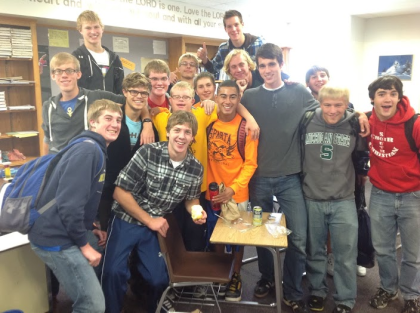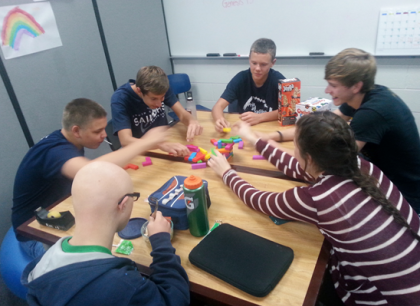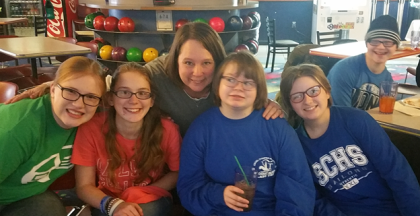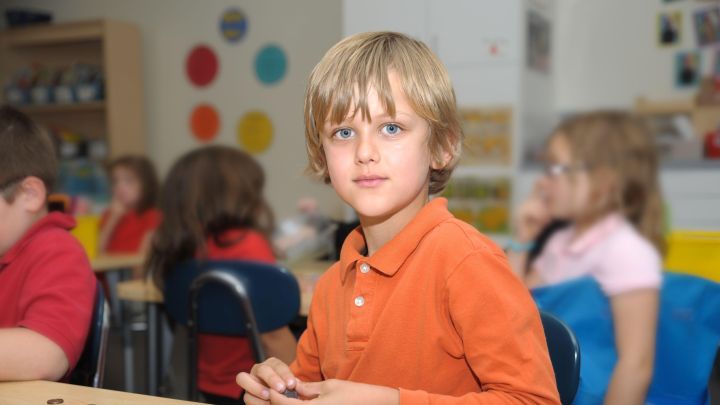Creating Connections: The Launch of Social Inclusion at South Christian

Jonathan with one of his many Lunch Partner groups.
At South Christian High School, a group of parents, teachers, and students with disabilities came together, inspired by a vision for God’s kingdom, to form a program that would encourage friendships between students with and without disabilities. Many of our students had participated in Circle of Friends programs in elementary and middle school, where peers committed to supporting students with disabilities. However, the students wanted to create something unique to meet the specific needs of high school students.
Thus, the Connections program was born.

Students enjoy playing games during Lunch Partners.
The Circuit Groups
In the early days, the first Connections Council—a talented group of high school students—began brainstorming ways to make these friendships happen. They decided to form Circuit groups, where students from different friend groups would come together to organize activities, play games, and spend time with one another. While the Circuit groups were successful for a time, they eventually grew too large, and some groups experienced challenges due to interpersonal dynamics.
Despite the initial struggles, the lessons we learned from the Circuit groups were invaluable. They paved the way for a new approach: Connections Lunch Partners.
The Launch of Lunch Partners
Learning from past experiences, the Connections Council launched Connections Lunch Partners, which became the foundation of the program today.
With verbal permission from both students and their parents, each Lunch Partner group is formed at the beginning of the school year. These groups consist of two to ten students without disabilities who partner with a student with a disability. Students without disabilities can sign up with friends or choose to be placed in new groups to meet new people. This model has addressed the need for smaller, more intimate groups, allowing for better interaction and fewer interpersonal conflicts.
An added blessing of this change is that students with disabilities often have multiple Lunch Partner groups, giving them opportunities to connect with different peers throughout the week.
Making the Lunch Hour Meaningful
Lunch can be a socially challenging time for any high school student. But for students with disabilities, it can be even more isolating. Connections Lunch Partners has transformed the lunch hour into a time of meaningful connection, where students can build friendships and truly belong.
Since its inception, Connections Lunch Partners has grown significantly. We now have over 200 students involved, meeting two to four times per month. None of us could have foreseen that what started as a small student-led initiative would grow to such an impactful, school-wide program.
Special Events and the Next Step
While Lunch Partners fostered incredible friendships, we noticed that students with disabilities were still often left out of after-school activities. High school students are active in sports, music, youth groups, and other activities—but because of the spontaneous nature of these plans, students with disabilities were rarely included.
This led to the launch of Connections Special Events, which are planned by the Connections Council to ensure students with disabilities can participate in fun, social activities outside of school hours. These events have allowed students to develop their talents, build responsibility, and enjoy time with their peers. Parents have expressed gratitude that their teens are being included in activities alongside their peers.
While we’ve seen great success with Special Events, we continue to pray for more spontaneous, organic interactions between students with and without disabilities. We encourage students to seek out those moments of connection beyond planned events.

We went on a bowling field trip for one of the Connections Special Events.
Trusting in God's Leading
If you feel called to address the social needs of students in your school, trust that God is at work. He has a heart for those who the world may overlook or forget. At South Christian, we’ve learned that starting small and praying throughout the process is key to creating meaningful change. Engage the hearts of your students, parents, and teachers in prayer, be excited about the possibilities, and let God lead the way.
Stay tuned for the final post in this series, where we’ll share how Connections has impacted the lives of students and how you can create similar programs in your school.
